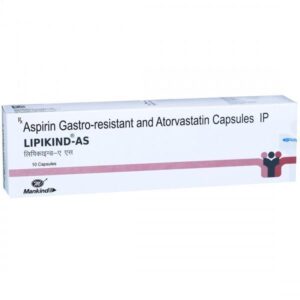ATORVASTATIN + ACETYL SALICYLIC ACID (ASA OR ASPIRIN)
Atorvastatin: Atorvastatin is a medication primarily used to lower cholesterol levels and reduce the risk of heart disease in individuals at high risk. It is sold under the brand name Lipitor.
Mechanism of Action:
Atorvastatin belongs to a class of drugs called statins, which work by inhibiting the enzyme HMG-CoA reductase. This enzyme is involved in the production of cholesterol in the liver. By inhibiting this enzyme, atorvastatin reduces the amount of cholesterol produced and increases the liver’s ability to remove cholesterol already present in the blood. This helps to lower total cholesterol, LDL cholesterol (“bad” cholesterol), and triglyceride levels, while increasing HDL cholesterol (“good” cholesterol) levels.
Use:
Atorvastatin is prescribed for the treatment of high cholesterol and to reduce the risk of cardiovascular events such as heart attack and stroke. It is also used to treat certain inherited cholesterol disorders.
Dose:
The recommended starting dose of atorvastatin for most adults is 10-20 mg taken once daily. The dosage may be increased if needed to achieve the desired cholesterol-lowering effect, but should not exceed 80 mg per day. The dose can be taken with or without food, and it is usually advised to take it at the same time each day.
Side Effects:
Common side effects of atorvastatin may include muscle pain, joint pain, diarrhea, constipation, nausea, headache, and stomach pain. These side effects are usually mild and temporary. However, rare but serious side effects can occur, such as liver problems, muscle breakdown, and an increased risk of diabetes. It is important to promptly report any unusual symptoms or severe side effects to a healthcare provider.
It is worth noting that statins, including atorvastatin, can interact with other medications, so it is important to inform your healthcare provider about all the medications you are taking to avoid potential drug interactions.
Overall, atorvastatin is a widely used medication that effectively lowers cholesterol levels and reduces the risk of cardiovascular events. It is important to take it as prescribed and to follow up with regular cholesterol screenings and medical check-ups.
Acetyl Salicylic Acid (asa Or Aspirin): Acetyl Salicylic Acid, commonly known as ASA or aspirin, is a widely-used non-steroidal anti-inflammatory drug (NSAID). It is primarily used for its analgesic (pain relieving), antipyretic (fever reducing), and antiplatelet (blood thinning) properties. ASA is available over-the-counter and in prescription strength.
Mechanism of Action:
ASA works by inhibiting the activity of an enzyme called cyclooxygenase (COX). COX is responsible for the synthesis of certain chemicals called prostaglandins, which play a role in pain signaling, inflammation, and fever. By inhibiting COX, ASA reduces the production of prostaglandins, thereby reducing pain, inflammation, and fever.
Use:
ASA is commonly used for the relief of mild to moderate pain, including headaches, dental pain, menstrual pain, muscle aches, and arthritis. It also reduces fever and is used for the prevention of heart attacks, strokes, and blood clot formation in certain individuals at high risk. However, it is important to consult a healthcare professional before using ASA for any of these conditions.
Dose:
The recommended dose of ASA may vary depending on the indication and the individual’s age, health status, and medical condition. It is important to follow the prescribed or recommended dose as directed on the package or by a healthcare professional. ASA is available in different strengths, such as 81 mg, 325 mg, and 500 mg tablets.
Side Effects:
While ASA is generally safe and well-tolerated, it can cause side effects in some individuals. Common side effects include upset stomach, heartburn, nausea, vomiting, and gastrointestinal bleeding. ASA may also increase the risk of bleeding, especially when taken in higher doses or for a prolonged period. Additionally, some individuals may experience allergic reactions, such as rash, swelling, or difficulty breathing.
It is important to note that ASA should not be given to children or teenagers who have or are recovering from flu-like symptoms or chickenpox, due to the risk of Reye’s syndrome, a rare but serious condition. ASA may also interact with certain medications, so it is important to inform your healthcare professional about all the medications, supplements, and medical conditions you have before using ASA.

